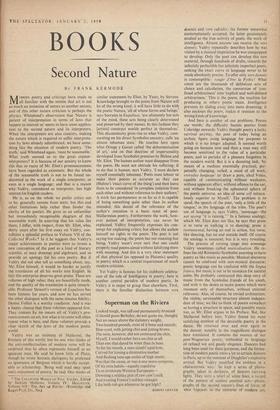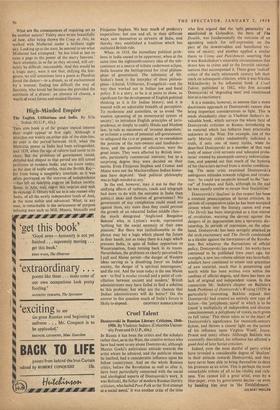BOOKS
Second Nature
BY FRANK
KER MODE
MODERN poetry and criticisms have made us all familiar with the notion that art is not so much an imitation of nature as another nature; and of this other nature criticism is perhaps the physics. Whitehead's observation that 'Nature is patient of interpretation in terms of laws that happen to interest us' seems to have some applica- tion to the second nature and its interpreters. When the interpreters are also creators, making the nature which is required to suffer interpreta- tion by laws already adumbrated, we have some- thing like the situation of modern poetry. 'The truth,' said Whitehead again, 'must be seasonable.' What truth seemed so to the great creator- interpreters? It is because of our anxiety to know this that so many of Mr. Eliot's pronouncements have been regarded as axiomatic. But the whole of the seasonable truth is not to be found un- distorted in the work of a single interpreter, or eyen in a single language; and that is a reason why Valery, considered as interpreter, has high interest for English readers.
He is, as on the whole we prefer critics not to be, generally remote from texts; but this and other limitations help rather than hinder the clarity of his poetics. He giyes us an unfamiliar but immediately recognisable diagram of this seasonable truth. In asserting that his value lies there, I differ, with respect, from Mr. Eliot, who, thirty years after his first essay on Valery, con- triliutes a splendid preface to Volume VII of the Collected Works.* In it he suggests that Valery's major achievements in poetics were to invent a new 'conception of the poet as a kind of literary scientist, at once dreamer and algebraist, and to provide an apology for his own poetry. But if Valdry did not also tell us something about, say, Mr. Eliot himself, it would be harder to justify the translation of all his works into English. In fact this enterprise deserves great praise. These are volumes of high value; they are beautifully made, and the quality of the translation is quite remark- able. Professor Stewart's version of Eupalinos has been famous for years, and now he has served the other dialogues with the same sinuous fidelity; Denise Folliot is a worthy coadjutor. And it was a happy chance that these volumes appeared first. They contain by no means all of Valdry's pro- nouncements on art, but what is to come will often repeat what is here, and these volumes provide a clear sketch of the laws of the modern poetic world.
Valdry was an intimate of Mallarmd, the Einstein of this world; but no one who thinks of the anti-intellectualism of modern verse will be surprised that he often represents himself as an ignorant man. He said he knew little of Plato, though he wrote Socratic dialogues; he professed an ignorance of Bergson which, is hardly accept- able to scholarship. 'Being well read may spoil one's enjoyment of poetry,' he said. One thinks of
* II(' !ID WORKSOP PAUL VAI.12RY, Edited
by Jackson Mathews. Volume IV: MAID/airs; Volume VII: THE ART OF POE-112Y. (Routledgc and Kcgan Paul, 21s., 30s.) similar statements by Eliot, by Yeats, by Stevens. Knowledge brought to the poem from Nature will be of the wrong kind; it will have little to do with the poetic Nature, 'all of whose forms and beings,' says Socrates in Eupalinos, 'are ultimately but acts of the mind, these acts being clearly determined and preserved by their names. In this fashion they [artists] construct worlds perfect in themselves.' This discontinuity gives rise to what Valdry, com- menting on his direct Symbolist ancestry, calls 'an almost inhuman state.' He touches here upon what Ortega y Gasset called 'the dehumanisation of art,' and on that doctrine of impersonality developed from Symbolist premises by Hulme and Mr. Eliot. The human author must disappear from the poem. He must not obtrude his suffering; if to do that is human, says Valery, 'I must declare myself essentially inhuman.' Poets must labour to make their poems as accurate as they can (Hulme's 'exact curve of the thing') and then leave them to be considered 'in complete isolation from each other and without reference to their authors.' A work has permanence in so far as it is capable of being something quite other than its author intended; this denial of the relevance of the author's intention is a basic tenet of post- Mallarmdan poetry. Furthermore the work, how- ever patient of interpretation, can never be explained. Valdry frequently expresses his con- tempt for explaining critics, but allows the author himself no rights in the poem. The poet is not saying but making; the poem has not meaning but being. Valery wasn't even sure that one could properly read poems aloud without falsifying them with meaning. And this is a very clear statement of that physical (as opposed to Platonic) quality in poetry which is a central requirement of much modern criticism.
Yet Valdry is famous for his stubborn celebra- tion of the role of Intelligence in poetry; here is another central paradox of modern poetic. In Valery it is easier to grasp than elsewhere. First, there is the familiar distinction between vers dontres and vers caleules; the former somewhat contemptuously accepted, the latter passionately studied as the true activity of poets, the work of intelligence. Almost anyone can receive the vers donnes; Valery repeatedly describes how he was visited by a musical inspiration he was unequipped to develop. Only the poet can develop this raw material, through hundreds of drafts, towards the infinitely perfectible but infinitely imperfect poem, seeking the exact curve in language, never to be made absolutely precise. To offer only vers donna is contemptible : rougir d'etre la Pythie! What count are the thousands of deliberate acts of choice and calculation, the conversion of 'con- fused arbitrariness' into 'explicit and well-defined arbitrariness.' This is the poem, the machine for producing in others poetic states. Intelligence prevents its sliding away into mere dreaming; it also encloses the poem, makes it resistant to the wrong kinds of knowledge.
And here is another of our problems. Poems use words; the difficulty haunts poetics from Coleridge onwards. Valdry thought poetry a lucky survival anyway, the poet of today being an archaic figure using language for purposes to which it is no longer adapted. It seemed worth going on because now and then a man may still become sensitised to the value of a particular poem, and so partake of a pleasure forgotten in the modern world. But it is a daunting task, 'by means of a medium essentially practical, per- petually changing, soiled, a maid of all work, everyday language' to 'draw a pure, ideal Voice, capable of communicating without weakness, without apparent effort, without offence to the ear, and without breaking the ephemeral sphere of the poetic universe, an idea of some self miracu- lously superior to Myself.' The problem is to- speak the speech of the poet, 'only a little of the tongue,' in the language of the tribe. The poet's use of language is, says Valery, `nonusage—the not saying "it is raining." ' In a famous analogy, which Mr. Eliot does not like, he says that prose is to verse as walking is to dancing; prose is insteumentai, having an end in action, but verse, like dancing, has no end outside itself. Of course the analogy is unsound; but it is very revealing.
The process of turning usage into nonusage Val6ry sometimes called musicalisation. He re- fines the old Romantic-Symbolist yearning to have poetry as like music as possible. Musical discourse cannot be confused with non-musical discourse; poetic language can be confused with the lingua franca, but music is not to be mistaken for natural noise. He probably contracted this deep envy of music from the Symbolist friends of his youth, and with it the desire to make poems which were , resonant only of themselves, without external reference. Also, of course, he envied architecture, the visible, serviceable structure almost indepen- dent of time; we like to think of poems nowadays as having a structure in space, and possibly music too, as Mr. Eliot argues in his Preface. But, like Mallarm6 before him, Valdry found his most satisfying emblem of the desirable poetry in the dance. He returned over and over again to the dancer, notably in the magnificent dialogue here translated. It contains the essence of our post-Wagnerian poetic, embodied in language of refined wit and gaudy elegance. Dancers had long been used for these purposes, and the forma- tion of modern poetic owes a lot to certain dancers in Paris, up to the moment of Diaghilev's explosive arrival. But Valdry modified the emblem in a characteristic way : he kept a series of photo- graphs, taken in darkness, of dancers carrying lights. They were a whirl of white lines, a record of the pattern of aimless poetical acts—photo- graphs of the second nature's lines of force, of what happens in the universe of modern art. What are the consequences of requiring art to be another nature? Valery once wrote beautifully of how, after being shown the Coup de Des, he walked with Mallarmd under a brilliant night sky. Looking up at the stars, he seemed to see what Mallarm6 had attempted : 'he has tried at last to raise a page to the power of the starry heavens.' Such attempts, in so far as they succeed, will cer- tainly be difficult, inaccessible. And this would be a tragic story, were it not that, defying the law- givers, we still sometimes love a poem as Phxdrus loved the dancer—in a dream, as of enchantment by a woman; finding too difficult the way of Socrates, who loved her because she provided the antithesis of a dream: an absence of chance, a world of exact forces and studied illusions.











































 Previous page
Previous page